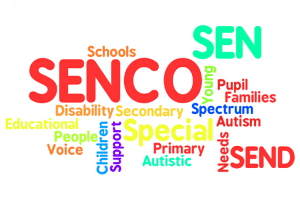Special Educational Needs (SEN)

'Special educational needs' is a legal definition and refers to children with learning needs or disabilities that make it harder for them to learn than most children the same age.
They may need support with :
- Speech, language and communication
- Behavioural, emotional and social difficulties
- Autistic spectrum conditions
- Specific learning difficulties, such as dyslexia and Attention Deficit Hyperactivity Disorder (ADHD)
Children progress at different rates and have different ways in which they learn best. When planning activities practitioners will take account of this by looking carefully at how they organise the environment, resources and will choose suitable ways to help your child learn. If your child is making slower progress or has particular needs in one area, they may be given extra help.
If a child is making slower progress than expected this doesn't necessarily mean that they have special educational needs.
A child's early years are a very important time for their physical, emotional, intellectual and social development. When a health visitor or doctor makes a routine check, they might suggest that they have a concern. If you have any worries of your own, you should ask for advice right away from nursery staff or managers who will signpost you to help and advice from specialists.
If it is agreed your child has a special educational need, we will use a step-by-step approach to meeting these, underpinned by thre SEN code of practise.
SEN Support is the system by which Early Years Settings / Schools assess the needs of children.
The system follows four stages, often referred to as a 'cycle':
- Assess - discussing the child's needs and creating a baseline assessment by which progress will be measured. Settings will also take into considertion any concerns raised by parents. The assessment should be reviewed regularly, with specific dates set for the next review.
- Plan - A plan of additional support is drawn up for a child, a record will be kept and the parents will be informed. It will be agreed what progress will be made (outcomes), and by what date (deadlines).
- Do - The child is given extra support, undertaken under the practitioner.
- Review - It is not specific how frequent the reviews are completed, but termly is the normal practice within our setting as we meet parents three times per year. Parents are fully involved at all stages.
Thoughout all stages the nursery can and will bring in specialists to advise on assessing SEN, especially in the early stages, and to offer advice on what support to give to both practitioners and parents.